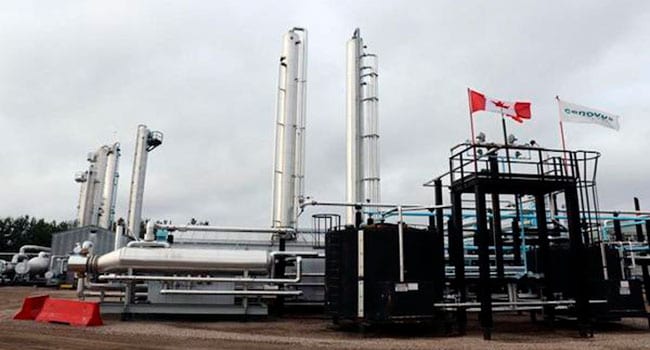 Cenovus Energy announced Thursday it is aiming to reduce its emissions intensity by 30 per cent by 2030.
Cenovus Energy announced Thursday it is aiming to reduce its emissions intensity by 30 per cent by 2030.
It also plans to achieve a minimum of $1.5 billion of additional spending with Indigenous businesses, reclaim 1,500 decommissioned well sites and complete $40 million of caribou habitat restoration work.
“Our environmental practices, low-emissions oil sands operations and the relationships we’ve built with residents in areas where we operate – including Indigenous communities – demonstrate our commitment to sustainability leadership,” said Alex Pourbaix, Cenovus President & Chief Executive Officer, in a news release.
“The meaningful targets we’re announcing today build on our achievements to date and position us to thrive in the transition to a lower-carbon future. I’m confident we have the right business model and talent in place to achieve them.”
In addition to its 2030 climate & GHG emissions target, Cenovus’s long-term ambition is to reach net zero emissions by 2050, it said.
“A global transition to a lower-carbon future is underway and Cenovus intends to be a part of that future,” said Pourbaix. “This is a complex challenge and requires exploring multiple options and opportunities. Our culture of innovation and sustainability leadership at Cenovus, alongside our relentless focus on cost management and operational excellence will support us in determining the best actions to pursue.”
The company said it is adopting a GHG emissions strategy that includes multiple options to reach its targets. Opportunities that have been identified are at various stages of advancement, and include: additional operational optimization, incorporating cogeneration capacity into future oil sands phases, more extensive deployment of solvent technology, further advancement of the methane emissions reduction initiatives already underway at its Deep Basin operations and additional operational efficiencies, including the use of data analytics.
Cenovus said it has spent almost $3 billion since 2009 with Indigenous owned or operated businesses. The company is now targeting additional cumulative spending with Indigenous businesses of at least $1.5 billion over the next decade as it continues to enable neighbouring communities to share in the benefits that come from responsibly developing oil and natural gas resources, it added. Cenovus’s 2030 Indigenous business spend target reflects cost efficiencies achieved by the company over the last few years as well as reduced annual capital spending compared with Cenovus’s first few years of operation.
“Indigenous communities are among our closest and most important neighbours,” Pourbaix said. “I’m proud of the relationships we have built to date and believe that our commitment over the next 10 years will further improve the fabric of these local communities.”
The views, opinions and positions expressed by columnists and contributors are the author’s alone. They do not inherently or expressly reflect the views, opinions and/or positions of our publication.


